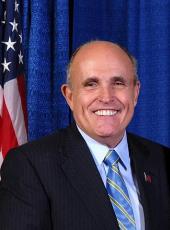Before Mayor Giuliani took office in 1994, New York City faced economic crisis and urban decay. Through a combination of tax cuts, economic revitalization and fiscally conservative governance, Mayor Giuliani turned a $2.3 billion deficit into a multi-billion dollar surplus, created a smaller and more efficient government, spurred private-sector job growth and gave New Yorkers their lowest tax burden in decades.
Fiscal Discipline
Turned Deficit into Surpluses: Mayor Giuliani inherited a $2.3 billion dollar budget deficit and turned it into a $2.9 billion surplus while cutting taxes 23 times and delivering balanced budgets.
Controlled Spending: The Giuliani Administration saved taxpayers more than $11.9 billion by controlling the projected growth of city-funded spending.
Practiced Fiscal Discipline: Giuliani reduced government spending as a portion of the city's economy for six straight years and kept the growth of government spending to nearly half the growth of the city economy.
Cut Taxes
Mayor Giuliani cut more taxes than any mayor in New York City history, reducing or eliminating 23 city taxes, ranging from personal income tax to the sales tax on clothing purchases to taxes on commercial rents. As he said in his first budget address to the people of New York, "We're going to cut taxes to attract jobs so our people can work."
These tax cuts saved individuals and businesses a total of over $9 billion.
By the end of Giuliani's term in office, New Yorkers enjoyed their lowest taxes in decades.
Reduced the Size of Government
Eliminated Bureaucracy: Giuliani created a smaller, more efficient government by cutting the number of full-time city-funded jobs by nearly 20%, excluding cops on the street and teachers in the classroom.
Reformed Welfare: When Rudy took office, 1.1 million New Yorkers – one out of every seven – was on welfare. Under his leadership, the City cut welfare rolls by more than 640,000 – to the lowest number since 1966 – eliminating fraud and abuse and turning Welfare Offices into Job Centers. Giuliani said: "At the core of our approach to welfare reform is the basic concept of a social contract-that for every right there is a duty, for every benefit an obligation."
This was accomplished while keeping the growth of government budgets smaller than the growth of the city economy – all while working with a City Council controlled by Democrats.
Privatized Government-Owned Businesses
Mayor Giuliani also streamlined the activities of city government by privatizing numerous government-controlled enterprises, providing revenues from the sales themselves and taxes paid by the newly privatized organizations. For example:
Sold WNYC radio for $20 million, WNYC-TV for $207 million, and the 54th Street Municipal Garage for $14 million.
Divested the United Nations Plaza hotel for $85 million and annual property taxes.
Sold the New York Coliseum to private developers for $345 million, creating the Time-Warner Center and spurring the revitalization of Columbus Circle.
Sold city-owned vacant lots to private benefactors which were converted into community gardens.
Oversaw a 70% drop in the number of housing units managed by the Department of Housing Preservation and Development.
Contracted city services from building inspections to bail processing, saving taxpayers money and creating private sector jobs.
Supply-Side Economics
Rudy is a strong advocate of supply-side economics because, as he says, "we practiced it for eight years in New York City and saw it work."
Unemployment was cut in half from 10.4% in January of 1994 to a low of 5.0% in May of 2001.
423,000 new private sector jobs were created.
Building permits increased by more than 63 percent, to 87,000 in FY2001 from 53,000 in FY1993.
Personal income in New York City increased by nearly 50% while taxes as a percentage of personal income dropped from 8.8% to 7.3%.
A key example of the ability of tax cuts to spur growth was the reduction in the hotel occupancy tax. By cutting the tax from an effective 20.6% to 14.6%, hotel guests saved more than $161 million in hotel taxes from 1995 to 2002. At the same time, New York City increased its revenue from the hotel tax by nearly 90%-from $127 million in FY94 to $239 million in FY01.
Rudy Giuliani, Giuliani Campaign Press Release - Rudy's Economic Record At A Glance Online by Gerhard Peters and John T. Woolley, The American Presidency Project https://www.presidency.ucsb.edu/node/295138

